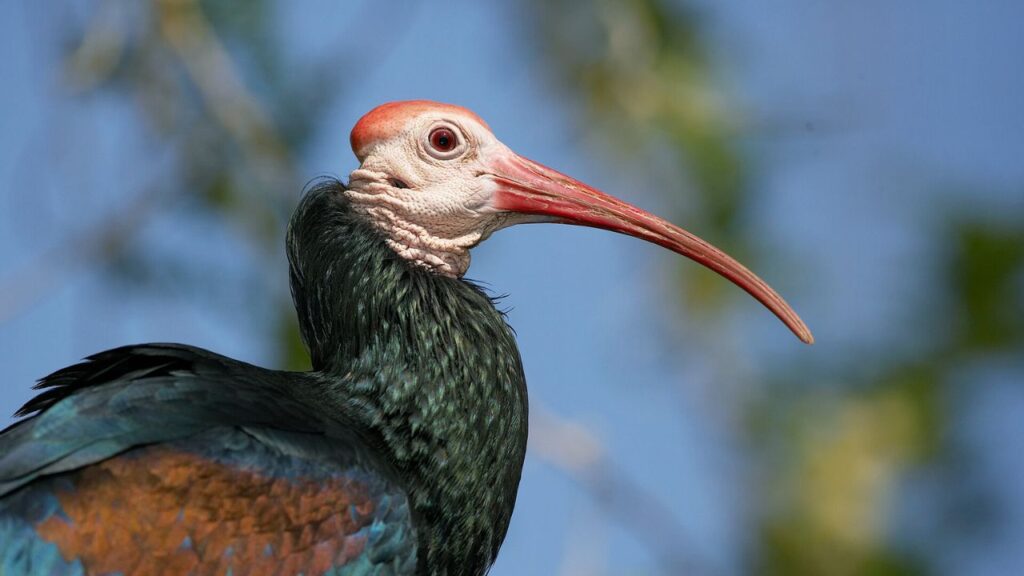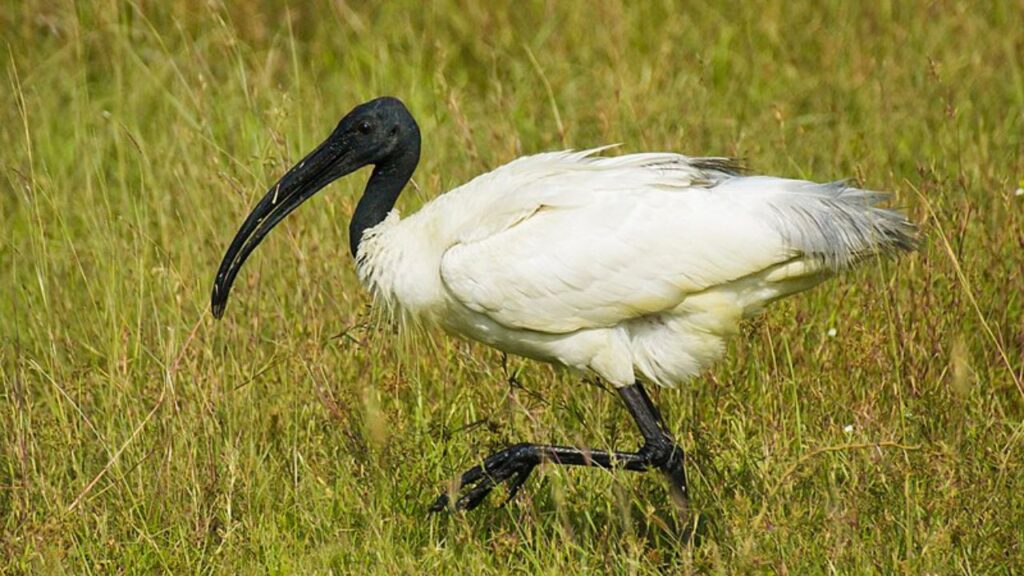Do Ibis Attack Humans? Ibis rarely attack humans, typically avoiding confrontation unless provoked. Any aggression is usually due to defensive behavior, particularly when protecting their nests.
Ibis are captivating birds, easily recognized by their long, curved beaks and graceful, almost serene presence as they wade through shallow waters or fly across open skies.
These birds are often admired for their beauty and their place in various cultural stories and beliefs.
Yet, as they increasingly find themselves in urban areas, mingling with human populations, a question arises: do Ibis ever attack humans? Are these birds a potential threat, or are they simply misunderstood?
This article seeks to answer these questions by delving deep into the behavior of Ibis, exploring whether they pose any danger to humans, and offering practical advice on how to avoid conflicts with these intriguing creatures.
Contents
What Is an Ibis?
Overview of the Ibis Species
Ibis are part of the Threskiornithidae family, a group that includes more than 30 species found across various continents, from the African savannas to the Australian wetlands, and even in the urban landscapes of many cities.
Their long legs and distinctively curved beaks make them easy to spot, especially in the environments where they are most commonly found—wetlands, marshes, and along coastlines. [Do Ibis Attack Humans?]
The diet of an Ibis primarily consists of small aquatic animals such as crustaceans, insects, and mollusks, which they skillfully extract from the mud with their specialized beaks. This feeding method is highly efficient, allowing them to thrive in diverse environments.
However, their adaptability has also led some species, like the Australian White Ibis, to become familiar sights in cities, where they often scavenge for food in less traditional settings, such as garbage bins and public parks.
The Ibis has a rich cultural significance in many parts of the world. For example, the Sacred Ibis was revered in ancient Egypt, often associated with Thoth, the god of wisdom and writing.
These birds were often mummified and placed in tombs as offerings to the gods. Today, while their sacred status might have diminished, their presence continues to inspire fascination and curiosity.
Ibis in Urban Areas
In many urban areas, particularly in Australia, the Ibis has become a common sight, earning nicknames like “bin chickens” due to their scavenging habits.
Their adaptability to urban life is both a testament to their resilience and a source of tension with human populations.
As cities expand and natural habitats shrink, Ibis have found new opportunities to thrive in environments that provide easy access to food, even if that food comes from human refuse.
The increased presence of Ibis in urban areas has led to more frequent interactions between these birds and people.
While some view the Ibis as a nuisance, particularly when they invade picnic areas or rummage through trash, others see them as an integral part of the city’s ecosystem.
Regardless of perspective, these interactions raise important questions about how to coexist with wildlife in shared spaces. [Do Ibis Attack Humans?]

Do Ibis Attack Humans?
Natural Behavior of Ibis
Ibis are generally peaceful birds that prefer to keep their distance from humans. Their primary focus is on foraging for food, which they do with remarkable efficiency.
In their natural habitats, Ibis are often seen in groups, wading through shallow waters in search of prey. They are social birds, often forming large flocks, especially during migration periods.
Their social structure is based on cooperation rather than aggression, with members of the flock working together to find food and protect their young.
In the wild, Ibis rarely display aggressive behavior towards other animals or humans. They are more likely to flee from a perceived threat than to confront it.
However, like all animals, they have instincts that drive their behavior, particularly when it comes to protecting their young or their territory.
During the breeding season, these instincts can lead to more assertive actions if the birds feel their nests are under threat.
Instances of Aggressive Behavior
Although Ibis are not known for being aggressive, there have been isolated instances where they have exhibited defensive behavior towards humans. [Do Ibis Attack Humans?]
These instances are typically linked to specific circumstances, such as humans inadvertently approaching too close to their nests or trying to interact with the birds in ways that the Ibis perceive as threatening.
Nesting season is a particularly sensitive time for Ibis. Like many bird species, Ibis become highly protective of their eggs and chicks during this period. If a person unknowingly ventures too close to a nesting site, the parent birds may react defensively.
This behavior is not unique to Ibis; it is a common trait among many bird species that rely on their instincts to protect their offspring from potential predators.
In urban areas, the situation can become more complex. Ibis that have become accustomed to human presence might lose some of their natural wariness, leading them to approach people more closely, especially if they associate humans with food.
This can sometimes result in aggressive behavior, not out of malice, but as a reaction to perceived competition or threat.
Reasons Behind Ibis Attacks
The primary reason for any aggressive behavior exhibited by Ibis is a perceived threat. Like all wild animals, Ibis are driven by instinctual behaviors that prioritize the safety and survival of themselves and their offspring.
When they feel threatened, their natural response is to defend themselves or their territory. [Do Ibis Attack Humans?]
Provoking an Ibis, either intentionally or unintentionally, can lead to defensive actions. This might include pecking, flapping their wings aggressively, or even making loud, warning calls to deter the perceived threat.
It’s important to remember that these birds do not attack out of spite or aggression but as a protective measure. [Do Ibis Attack Humans?]
Human activities, such as feeding Ibis or trying to interact with them, can also contribute to aggressive behavior. Feeding wild animals can disrupt their natural behaviors and lead to dependency on human-provided food sources.
This dependency can cause Ibis to become more aggressive in seeking out food, as they lose their natural fear of humans and become more assertive in their interactions.

Are Ibis Attacks Dangerous?
Severity of Ibis Attacks
While the thought of being attacked by an Ibis might be alarming, the reality is that such attacks are exceedingly rare and typically not dangerous. [Do Ibis Attack Humans?]
The most common form of aggression from an Ibis might involve a peck or a flap of their wings, which, while potentially startling, is unlikely to cause serious harm.
Ibis do not have the powerful beaks or talons that some birds of prey possess, and their primary tools for defense are their relatively mild pecks and the intimidating display of their wings.
Most reported incidents involving Ibis are more of a nuisance than a danger. For example, an Ibis might snatch food from an unsuspecting person’s hand or knock over items while rummaging through a picnic area. These actions, while bothersome, are not typically harmful.
However, it is important to acknowledge that any wild animal, including an Ibis, can potentially cause injury if they feel sufficiently threatened.
For example, if an Ibis were to peck at a person’s face or eyes, there could be a risk of injury, albeit minor. It’s always best to exercise caution and avoid situations where an Ibis might feel cornered or threatened.
Medical Implications
If you ever find yourself on the receiving end of an Ibis’s defensive actions, the likelihood of serious injury is low. [Do Ibis Attack Humans?]
However, as with any interaction with wild animals, there is a risk of minor injuries such as scratches or cuts. These injuries, while generally not severe, should be treated promptly to avoid the risk of infection.
If you are scratched or pecked by an Ibis, it’s advisable to clean the wound thoroughly with soap and water and apply an antiseptic.
In most cases, this is sufficient to prevent any complications. However, if the wound is deep, if you experience significant pain or swelling, or if you notice signs of infection (such as redness, warmth, or pus), you should seek medical attention.
It’s also important to consider the potential for zoonotic diseases, which are diseases that can be transmitted from animals to humans. [Do Ibis Attack Humans?]
While the risk of contracting a disease from an Ibis is extremely low, it’s always wise to take precautions, especially if you have an open wound or if the bird has come into contact with your face or mouth.

How to Avoid Ibis Attacks
Respect Their Space
The most effective way to avoid any negative interactions with Ibis is to respect their space. These birds are not naturally aggressive and will typically avoid confrontation if they do not feel threatened.
If you encounter an Ibis, particularly during the nesting season, it’s important to give them plenty of space.
Avoid approaching nests or getting too close to groups of Ibis, as this can trigger defensive behavior. [Do Ibis Attack Humans?]
When observing Ibis in the wild or in urban areas, use binoculars or a zoom lens to admire them from a distance.
This not only ensures your safety but also minimizes stress on the birds, allowing them to go about their natural behaviors without feeling threatened.
Avoid Feeding Ibis
Feeding wild animals, including Ibis, is a practice that can lead to a variety of problems, both for the birds and for humans.
When Ibis are fed by people, they can become accustomed to this easy food source, leading to a loss of their natural foraging behaviors.
This dependency can result in more frequent and closer interactions with humans, increasing the likelihood of aggressive behavior as the birds become more assertive in seeking out food.
Moreover, the types of food that humans provide are often not suitable for wild birds and can lead to health issues. [Do Ibis Attack Humans?]
Foods high in salt, sugar, or fat can cause malnutrition or other health problems for Ibis. By avoiding feeding Ibis, you help them maintain their natural diet and reduce the chances of negative interactions.
What to Do if Confronted by an Aggressive Ibis
If you find yourself confronted by an aggressive Ibis, it’s important to remain calm and avoid any sudden movements that could further agitate the bird.
Slowly backing away while keeping your eyes on the bird can help de-escalate the situation. If possible, try to put a physical barrier between yourself and the Ibis, such as a tree, a bench, or even an umbrella.
It’s also helpful to avoid making loud noises or sudden gestures, as these can be perceived as threats by the bird. In most cases, the Ibis will lose interest once it perceives that you are no longer a threat and will move away on its own.
If an Ibis continues to approach aggressively, consider using a gentle deterrent, such as making yourself look larger by raising your arms or using an object to create a barrier. However, always prioritize your safety and do not attempt to physically engage with the bird.
Final Verdict
Ibis are generally peaceful and non-aggressive birds that pose little threat to humans. The rare instances of aggression are usually tied to specific circumstances, such as protecting their nests or being fed by humans, which can alter their natural behaviors.
While the likelihood of an Ibis attack is low, it’s important to respect these birds and avoid behaviors that could provoke them. [Do Ibis Attack Humans?]
By understanding their behavior and maintaining a respectful distance, you can coexist peacefully with Ibis, whether you encounter them in the wild or in urban settings.
See Also: Do Eels Attack Humans? The Shocking Facts To Know!
FAQs
Do Ibis carry any diseases?
Ibis, like many birds, can carry diseases, but the risk of transmission to humans is very low. It’s best to avoid direct contact with wild birds and wash your hands if you do come into contact with bird droppings or feathers.
Can I keep an Ibis as a pet?
No, Ibis are wild birds and are not suitable as pets. They are protected in many areas, and it is illegal to keep them as pets. Additionally, their needs are best met in their natural habitats. [Do Ibis Attack Humans?]
What should I do if I see an injured Ibis?
If you encounter an injured Ibis, it’s best to contact local wildlife authorities or a bird rescue organization. They have the expertise to handle and care for injured wild birds, ensuring they receive the appropriate treatment.
Why are Ibis attracted to urban areas?
Ibis are attracted to urban areas primarily due to the availability of food sources, such as garbage and food scraps. Urban environments also offer suitable nesting sites and fewer natural predators.
Are all species of Ibis aggressive?
No, Ibis species are generally not aggressive. Any aggressive behavior is typically due to specific circumstances, such as protecting their nests or defending their young. Most Ibis prefer to avoid confrontation and are peaceful in nature.
Conclusion: Do Ibis Attack Humans?
Ibis are remarkable birds that add beauty and diversity to our natural and urban environments. While they are generally harmless to humans, understanding their behavior is key to preventing any negative interactions.
By respecting their space, avoiding feeding them, and knowing how to respond if confronted by an aggressive Ibis, we can coexist with these birds in a way that is safe and beneficial for both humans and wildlife.
As our urban environments continue to expand, fostering a peaceful relationship with the wildlife that shares these spaces is more important than ever.
Whether you encounter an Ibis in the wild or in the heart of a city, appreciating their role in our ecosystem and treating them with respect will ensure that these interactions remain positive.

Hello, I am Rosa Ellis, a mother of two and a wildlife blogger. I grew up in New York City, but I love exploring forests. I’ve traveled to places like Yellowstone National Park and the Amazon Rainforest to see animals up close. I know a lot about animal behavior and which animals can be dangerous to humans. Thanks for visiting my blog!

